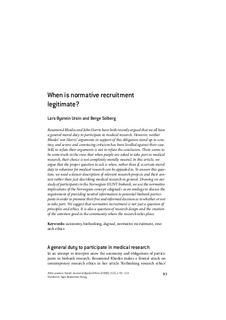When is normative recruitment legitimate?
Journal article, Peer reviewed
Permanent lenke
http://hdl.handle.net/11250/2367522Utgivelsesdato
2008Metadata
Vis full innførselSamlinger
Sammendrag
Rosamond Rhodes and John Harris have both recently argued that we all have a general moral duty to participate in medical research. However, neither Rhodes’ nor Harris’ arguments in support of this obligation stand up to scrutiny, and severe and convincing criticism has been levelled against their case. Still, to refute their arguments is not to refute the conclusion. There seems to be some truth in the view that when people are asked to take part in medical research, their choice is not completely morally neutral. In this article, we argue that the proper question to ask is when, rather than if, a certain moral duty to volunteer for medical research can be appealed to. To answer this question, we need a denser description of relevant research projects and their context rather than just describing medical research in general. Drawing on our study of participants in the Norwegian HUNT biobank, we use the normative implications of the Norwegian concept «dugnad» as an analogy to discuss the requirement of providing neutral information to potential biobank participants in order to promote their free and informed decision as to whether or not to take part. We suggest that normative recruitment is not just a question of principles and ethics. It is also a question of research design and the creation of the common good in the community where the research takes place.
Keywords: autonomy, biobanking, dugnad, normative recruitment, research ethics
